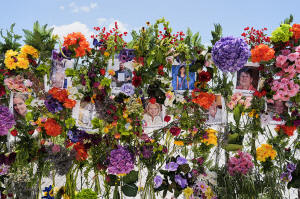Texas leads nation in flood deaths due to geography, size and population
[July 14, 2025]
By SETH BORENSTEIN
Even before the Central Texas floods that killed more than 100 people,
the state was by far the leader in U.S. flood deaths due partly to
geography that can funnel rainwater into deadly deluges, according to a
study spanning decades.
From 1959 to 2019, 1,069 people died in Texas in flooding, which is
nearly one-fifth of the total 5,724 flood fatalities in the Lower 48
states in that time, according to a 2021 study in the journal Water.
That's about 370 more than the next closest state, Louisiana.
Flooding is the second leading weather cause of death in the country,
after heat, both in 2024 and the last 30 years, averaging 145 deaths a
year in the last decade, according to the National Oceanic and
Atmospheric Administration.
Other floods have turned deadly this year: Last month in San Antonio, 13
people died including 11 people who drove into water thinking they could
get through, according to study author Hatim Sharif, a professor of
civil and environmental engineering at the University of Texas at San
Antonio who studies why people die in floods.
For several years Sharif has urged state and local officials to
integrate better emergency action programs to use flood forecasts and
save lives by alerting people and closing off vulnerable intersections
where roads and water meet.
“I think in Kerr County, if they had an integrated warning system that
uses rainfall forecasts to forecast real-time impacts on the ground,
that could have saved many lives and could have also helped emergency
crews to know which location would be flooded, which roads would be
impassable,” Sharif said. “They could have taken action.”

The role of geography and terrain
Texas has so many deaths because of its geography, population and size,
experts say. The area where the most recent deadly floods struck is
known as flash flood alley because of hills and valleys.
“Steep, hilly terrain produces rapid runoff and quick stream rises,
since the water will travel downhill at greater speed into rivers and
over land,” said Kate Abshire, lead of NOAA’s flash flood services.
“Rocky terrain can exacerbate the development of flash floods and raging
waters, since rocks and clay soils do not allow as much water to
infiltrate the ground.”
“Urban areas are especially prone to flash floods due to the large
amounts of concrete and asphalt surfaces that do not allow water to
penetrate into the soil easily,” she said.
Along with those hills, “you’ve got the Gulf of Mexico right there, the
largest body of hot water in the entire North Atlantic most of the
time,” said Jeff Masters a former government meteorologist who
co-founded Weather Underground and now is at Yale Climate Connections.
“So you’ve got a ready source of moisture for creating floods.”
[to top of second column]
|

Photographs of flood victims are displayed on a memorial wall in
Kerrville, Texas, Thursday, July 10, 2025. (AP Photo/Ashley Landis)
 Preventable driving deaths
Historically, many of the deaths were preventable across the nation
and in Texas alike, according to experts. Masters said nothing
illustrates that better than one statistic in Sharif's study: 86% of
flood deaths since 1959 were people driving or walking into
floodwaters.
Nearly 58% of the deaths were people in cars and
trucks. It's a problem especially in Texas because of hills and low
lying areas that have more than 3,000 places where roads cross
streams and waterways without bridges or culverts, Sharif said.
“People in Texas, they like trucks and SUVs, especially trucks,”
Sharif said. “They think trucks are tough, and that is I think a
factor. So sometimes they use their big car or SUV or truck, and
they say they can beat the flood on the street ... especially at
night. They underestimate the depth and velocity of water.”
Abshire said that not only do people ignore the weather service's
safety mantra, “Turn around, don’t drown,” but studies found that a
number of these fatalities occur when people actively drive around
barricades and barriers blocking flooded roads.
The latest Texas Hill Country flooding was less typical because so
many of the deaths were in a camp where the water overtook the
victims, not people going into the water, Sharif said. Only about 8%
of flood deaths in the last 60 years happened in permanent homes,
mobile homes or camping, according to the study.
The July 4th floods happened at night, a common time for flood
deaths. More than half of deaths since 1959 have occurred at night,
when it's dark and people can't see how much flooding there is or
are not awake for the warnings, Sharif's study found.
As far as demographics, about 62% of U.S. flood deaths were male,
according to the study.
“Risk-taking behavior is usually associated with men,” Sharif said,
adding that it's why most fatal victims of car crashes are male.
All contents © copyright 2025 Associated Press. All rights reserved
 |